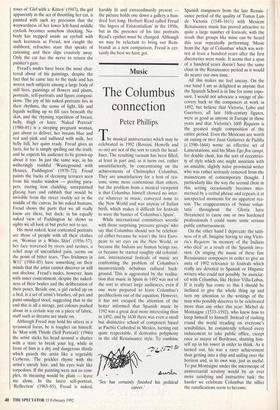Music
The Columbus connection
Peter Phillips
The musical anniversaries which may be celebrated in 1992 (Rossini, Howells and so on) are not of the sort to catch the head- lines. The resulting vacuum has been filled, at least in part and, as it turns out, rather unsatisfactorily, by concentrating on the achievements of Christopher Columbus. They are unsatisfactory for a host of rea- sons, some more contentious than others, but the problem from a musical viewpoint is that Columbus himself showed no inter- est whatever in music, conveyed none to the New World and was anyway of Italian birth, which makes it difficult for festivals to wave the banner of 'Columbus's Spain'.
While international committees wrestle with those surprising 'pressure groups' who say that Columbus should not be celebrat- ed either because he wasn't the first Euro- pean to set eyes on the New World, or because the Indians are human beings too, or because he started naughty old colonial- ism, international festivals of music are confronting the problem of Columbus's inconveniently nebulous cultural back- ground. This is aggravated by the realisa- tion that music in Spain in 1492 was not of the sort to attract large audiences, even if one were prepared to leave Columbus's predilections out of the equation. However, it has not escaped the attention of the better informed that Spanish music by 1592 was a great deal more interesting than in 1492; and by 1630 there was even a small but distinctive school of composers based at Puebla Cathedral in Mexico, turning out quite respectable, if derivative polyphony in the old Renaissance style. To combine
'Sex has certainly finished his political career.' Spanish composers from the late Renais- sance period of the quality of Tomas Luis de Victoria (1548-1611) with Mexican Renaissance music has proved attractive to quite a large number of festivals; with the result that groups like mine can be heard this year repeatedly performing 'Music from the Age of Columbus' which was writ- ten at least a hundred years after the first discoveries were made. It seems that a span of a hundred years doesn't have the same clout in the Renaissance period as it would do nearer our own time.
All this makes me feel uneasy. On the one hand I am as delighted as anyone that the Spanish School is in line for some expo- sure. I would not advocate a voyage of dis- covery back to the composers at work in 1492, but believe that Victoria, Lobo and Guerrero, all late 16th-century figures, were as good as anyone in Europe in those years and that Victoria's 1605 Requiem is the greatest single composition of the entire period. Even the Mexicans are worth an outing or two: Juan Gutierrez de Padilla (c.1590-1664) wrote an effective set of Lamentations, and his Mass Ego flos campi, for double choir, has the sort of eccentrici- ty of style which one might associate with an amiable, slightly naive provincial writer who was rather seriously removed from the mainstream of contemporary thought. I particularly like the way the second choir in this setting occasionally becomes mes- merised by a verbal phrase and repeats it at unexpected moments for no apparent rea- son. The reappearances of 'bonae volun-
tatis' throughout the Gloria have threatened to cause one or two hardened professionals I could name some serious public embarrassment.
On the other hand I deprecate the tatti- ness of it all. Imagine having to sing Victo- ria's Requiem 'in memory of the Indians who died' as a result of the Spanish inva- sion. Or singing the music of these fine Renaissance composers in order to give an aura of 1992 relevance to festivals which really are devoted to Spanish or Hispanic writers who could not possibly be associat- ed with Columbus, like Heitor Villa-Lobos. If it really has come to this I should be inclined to give the whole thing up and turn my attention to the writings of the man who possibly deserves to be celebrated more than any other this year: Michel de Montaigne (1533-1592), who knew how to
keep himself to himself. Instead of rushing round the world treading on everyone's sensibilities, he consistently refused every inducement to take public office, except once as mayor of Bordeaux, shutting him- self up in his tower in order to think. As it turned out, his was a rarer achievement than getting into a ship and sailing over the horizon and, in its own way, just as useful.
To put Montaigne under the microscope of anniversarial scrutiny would be an ever more satisfying and instructive task: the harder we celebrate Columbus the sillier the ramifications seem to become.


























































 Previous page
Previous page